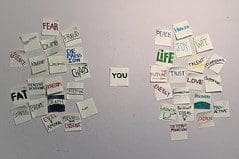Decisions Decisions Decisions
 Decisions, decisions! From cars to careers and lipsticks to lovers, few generations have faced more choices in life than today’s 20-something women, or enjoyed more freedom to make them. It’s exciting but also daunting, and we debate and equivocate and endlessly procrastinate, torn between our heads and our hearts.
Decisions, decisions! From cars to careers and lipsticks to lovers, few generations have faced more choices in life than today’s 20-something women, or enjoyed more freedom to make them. It’s exciting but also daunting, and we debate and equivocate and endlessly procrastinate, torn between our heads and our hearts.
Pressure of Choice
The reason we find decisions frightening is that to choose something is by definition to reject everything else -to close the door on other possibilities. In Predictably Irrational: The Hidden Forces That Shape Our Decisions (Harper Collins), Dan Ariely, professor of behavioral economics at the Massachusetts Institute of Technology (MIT) in the US, tells how in SBC the Chinese general Xiang Yu got his reluctant troops to focus on crossing a river into enemy territory by breaking their cooking pots and burning their ships.Conducting experiments with students at MIT, Ariely found that closing doors on options by making a decision produces in us the pain of loss. And fear of this can hold us back, stopping us from committing to a new job or to an exclusive relationship in marriage – Amita’s current quandary.
Head vs Heart
Most decisions come down to head versus heart. Head decisions are left-brain, says self-awareness coach Barbara Scogings. They’re analytical and one-dimensional, centered on conscious, logical, rational thinking.
We come to them by objectively considering the pros and cons of different options, assigning values and weights to each, and considering best- and worst-case scenarios and the probabilities of these.
Heart decisions, on the other hand, are right-brain. They’re emotional; rooted in our feelings and intuition. We arrive at them by listening to our inner voice, visualizing different options and their implications, noticing the feelings associated with each, sometimes even considering our dreams, looking to our subconscious for guidance.
Basic personality type will play a role. People driven predominantly by the heart are ‘feelers, life’s lovers’, says Anthony Falikowski, author of Mastering Human Relations (Pearson). They tend to be intuitive, unconventional, exploratory, sociable, compassionate and humane. In contrast, head people, who he calls ‘life’s logicians’, mostly need time to plan and consider, like to organize and synthesize information, prefer to learn vicariously through books, store large amounts of knowledge and information, and are interested in ideas and theories.
‘Good decision-making is a learnt skill and must be exercised like a muscle to build strength,’ say leadership coaches Annette Geffert and Diane Brown, authors of A Toolbox For Our Daughters (New World Library). Positive growth and change require the development of what they call our ‘internal decision-making centre or ‘connected inner guide’. Unchecked, the head and the heart have no desire for balance – each pushes hard for control, and when one is allowed to dominate it’s at the expense of the other. But both are needed for us to function ‘in harmony and balance’.
From our late teens through our 20s, our behavior tends to be more heart-driven, says Scogings. ‘In ancient tradition, the heart is the seat of authentic intelligence and it’s important to listen to it. But because you’re still emotionally immature, your heartfelt actions will often be impulsive and need to be tempered with reason until you can use the two more equally, usually around age 30. Permanent contentment will grow out of a balance between heartfelt and logical choices.’
‘We need to acknowledge whether we are predominantly heart-or head-driven, then consciously step into the opposite space for a while when we make decisions. If that’s too hard we need to seek mediation or advice from a trusted friend who operates in that opposite space and can play devil’s advocate, or from a coach or counselor.’
When we pursue our passion, we tend to be more joyful. This brings about a physiological change in our bodies – our heartbeat actually becomes more regular, stress levels drop and we’re more at peace. ‘Heart decisions tend to be ‘love-driven’, positive and energizing, while head ones can be fear-driven, negative and debilitating.’ The way you feel after making a decision will indicate whether it’s right for you. If you’re tense and stressed, rethink it. If you’re relaxed and content, it’s almost certainly the right decision for you, at least for now.
‘Don’t look for perfection,’ concludes Krummeck. This is an imperfect universe. Remember: avoiding making a decision is to make a decision by default – often one that puts your life on hold. ‘Be glad you have the power to choose, choose as well as you can, and follow through on the choice. Learn whatever you can from it. You will grow in the process’.

